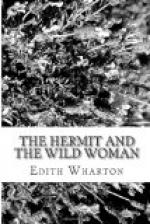At first her days were fire and the nights long solemn vigils. Her thoughts were no longer vulgarized and defaced by any notion of “guilt,” of mental disloyalty. She was ashamed now of her shame. What had happened was as much outside the sphere of her marriage as some transaction in a star. It had simply given her a secret life of incommunicable joys, as if all the wasted springs of her youth had been stored in some hidden pool, and she could return there now to bathe in them.
After that there came a phase of loneliness, through which the life about her loomed phantasmal and remote. She thought the dead must feel thus, repeating the vain gestures of the living beside some Stygian shore. She wondered if any other woman had lived to whom nothing had ever happened? And then his first letter came. . . .
It was a charming letter—a perfect letter. The little touch of awkwardness and constraint under its boyish spontaneity told her more than whole pages of eloquence. He spoke of their friendship—of their good days together. . . . Ransom, chancing to come in while she read, noticed the foreign stamps; and she was able to hand him the letter, saying gaily: “There’s a message for you,” and knowing all the while that her message was safe in her heart.
On the days when the letters came the outlines of things grew indistinct, and she could never afterward remember what she had done or how the business of life had been carried on. It was always a surprise when she found dinner on the table as usual, and Ransom seated opposite to her, running over the evening paper.
But though Dawnish continued to write, with all the English loyalty to the outward observances of friendship, his communications came only at intervals of several weeks, and between them she had time to repossess herself, to regain some sort of normal contact with life. And the customary, the recurring, gradually reclaimed her, the net of habit tightened again—her daily life became real, and her one momentary escape from it an exquisite illusion. Not that she ceased to believe in the miracle that had befallen her: she still treasured the reality of her one moment beside the river. What reason was there for doubting it? She could hear the ring of truth in young Dawnish’s voice: “It’s not my fault if you’ve made me feel that you would understand everything. . . .” No! she believed in her miracle, and the belief sweetened and illumined her life; but she came to see that what was for her the transformation of her whole being might well have been, for her companion, a mere passing explosion of gratitude, of boyish good-fellowship touched with the pang of leave-taking. She even reached the point of telling herself that it was “better so”: this view of the episode so defended it from the alternating extremes of self-reproach and derision, so enshrined it in a pale immortality to which she could make her secret pilgrimages without reproach.




